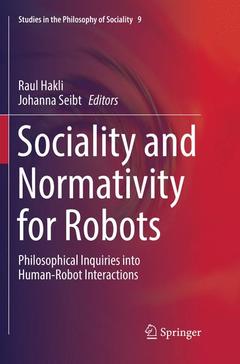Sociality and Normativity for Robots, Softcover reprint of the original 1st ed. 2017 Philosophical Inquiries into Human-Robot Interactions Studies in the Philosophy of Sociality Series, Vol. 9
Coordonnateurs : Hakli Raul, Seibt Johanna

This volume offers eleven philosophical investigations into our future relations with social robots--robots that are specially designed to engage and connect with human beings. The contributors present cutting edge research that examines whether, and on which terms, robots can become members of human societies. Can our relations to robots be said to be "social"? Can robots enter into normative relationships with human beings? How will human social relations change when we interact with robots at work and at home?
The authors of this volume explore these questions from the perspective of philosophy, cognitive science, psychology, and robotics. The first three chapters offer a taxonomy for the classification of simulated social interactions, investigate whether human social interactions with robots can be genuine, and discuss the significance of social relations for the formation of human individuality. Subsequent chapters clarify whether robots could be said to actually follow social norms, whether they could live up to the social meaning of care in caregiving professions, and how we will need to program robots so that they can negotiate the conventions of human social space and collaborate with humans. Can we perform joint actions with robots, where both sides need to honour commitments, and how will such new commitments and practices change our regional cultures? The authors connect research in social robotics and empirical studies in Human-Robot Interaction to recent debates in social ontology, social cognition, as well as ethics and philosophy of technology. The book is a response to the challenge that social robotics presents for our traditional conceptions of social interaction, which presuppose such essential capacities as consciousness, intentionality, agency, and normative understanding. The authors develop insightful answers along new interdisciplinary pathways in "robophilosophy," a new research area that will help us to shape the "robot revolution," the distinctive technological change of the beginning 21st century.Chapter 1. Raul Hakli & Johanna Seibt; Introduction to the Philosophy of Robot Sociality.- Chapter 2. Johanna Seibt; Varieties of the ‘As-If’: Towards a Taxonomy of Human-Robot Interaction.- Chapter 3. Mark Bickhard; Robot Sociality: Genuine or Simulation?.- Chapter 4. David Eck & Alex Levine; Prioritizing Otherness: The Line Between Vacuous Individuality and Hollow Collectivism.- Chapter 5. Frank Esken; Can Robots be (or ever become) Normative Agents?.- Chapter 6. Antonio Carnevale; Ontology, Normativity in the Care-Robot Relationship.- Chapter 7. Maria Brincker; The Dynamics of Social Affordances.- Chapter 8. Jedediah W.P. Allen & Hande Ilgaz; Social Meta-Learning: Learning How to Make Use of Others as a Resource for Learning.- Chapter 9. Vìctor Fernández Castro; Shaping Robotic Minds.- Chapter 10. Aurélie Clodic, Rachid Alami, Raja Chatila & Elisabeth Pacherie; Key Elements of Joint Human-Robot Action.- Chapter 11. Felix Lindner & Carola Eschenbach; Affordances and Affordance Space (this paper is still unconfirmed).- Chapter 12. Hans Bernhard Schmid; From Reliability to Cooperative-Mindedness.- Chapter 13. Alessandro Salice & John Michael; Joint Commitments and Group Identification in Human-Robot Interaction.
Johanna Seibt (PhD. at the Univ of Pittsburg, USA; Dr. phil. habil. at the Univ of Konstanz, Germany) is Professor for Applied Process Ontology and Integrative Social Robotics, Aarhus University, Denmark; previously she taught at the Univ of Texas at Austin, USA. Her main research area is in analytical ontology and metaphysics. More recently she works also in philosophy of social robotics. She is head of the Research Unit for Robophilosophy at the School for Culture and
Society, Aarhus University, which conducts interdisciplinaryHumanities research of and in social robotics and coordinates the international Research Network for Transdisciplinary Studies in Social Robotics (TRANSOR).
Explores the conditions of sociality and normativity in interactions between humans and robots
Defines a new area of conceptual and empirical investigation in the intersection of technology and social agency
Details the ways philosophy of sociality and social robotics mutually challenge and supplement each other
Date de parution : 08-2018
Ouvrage de 267 p.
15.5x23.5 cm
Date de parution : 06-2017
Ouvrage de 267 p.
15.5x23.5 cm
